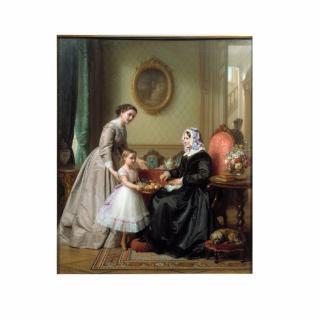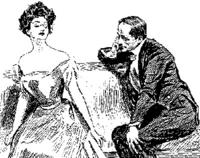 In case you've never heard the word "etiquette" it means "The body of prescribed social usages" and "Any special code of behavior or courtesy." In a polite society it is the way in which individuals deal with each other socially. It is a set of rules of good manners and behavior that changes with the times. Etiquette contains rules for the simplest actions ( such as, "Hello" or "How are you?") to rules for the most elaborate social event.
In case you've never heard the word "etiquette" it means "The body of prescribed social usages" and "Any special code of behavior or courtesy." In a polite society it is the way in which individuals deal with each other socially. It is a set of rules of good manners and behavior that changes with the times. Etiquette contains rules for the simplest actions ( such as, "Hello" or "How are you?") to rules for the most elaborate social event.Why am I telling you this? Because I think a lot of young people today are growing up in a society that is, in many ways, lacking in social etiquette. In some cases, manners have been thrown out the window entirely. What ever happened to "Please!" and "Thank-You!" What has happened to table manners, thank-you cards for gifts received, common courtesy, polite telephone manners, polite rules of the road, treating others as you wish to be treated, lending a hand without worrying about "what's in it for me (or, my personal favorite, why should I?)" and, last but not least, respect for your elders?
Etiquette is a French word meaning "ticket" that came to mean a prescribed routine that is passed down. In France, this began with court behavior and quickly spread to requirements of good behavior in court circles and among aristocrats. Eventually, etiquette became the responsibility of the parents to impart some degree of good manners and behavior down to their children, and so on and so on. So, do we blame the parents, the grandparents, or the youth of today? Do we then hold the youth of today blameless. I don't think so.
Etiquette became the norm for all social behavior and there wasn't a society more in tune with etiquette then that of the Victorian Era (surprise, surprise, one of my favorites.) So, I thought it would be interesting to take a look at some of the Victorian Rules of Etiquette (and there were many of them) to see if, perhaps, it could be applied to today. The Victorians had so many rules that it would impossible in a short posting to capture them all. Some of their rules were appropriate, others down right foolish. So, I thought I'd take a look at the Victorian Rules of Etiquette a little at a time and post different articles to my Linda's Blog from time to time. Something for all my Blog readers to look forward to.
First of all, you need to understand that ninety percent of everything you might find in a Victorian Rules of Etiquette manual is nothing more than "common courtesy." So, the first Victorian Rule of Etiquette is "If it would be rude now, it was rude then." The ultimate Victorian Rule of Etiquette was in always trying to follow the "Golden Rule", and that is "To Do Unto Others As You Would Have Then Do Unto You." I don't believe that the Golden Rule has changed, do you?
For this article, let's take a look at "Victorian Visiting Etiquette" and see if any of their rules could be applied to today.

Some rules while visiting:
1) Do not enter a room without knocking first and receiving an invitation to come in - That definitely applies to today. In fact, any brother or sister could tell you that you NEVER enter some one's room (especially a sibling) without their permission. What do you think all those KEEP OUT - AND THIS MEANS YOU signs on the door are for?
2) Always Be On Time - This definitely applies to today. In fact, it's one rule that I'm sure is broken more today then it was in the Victorian era. Definitely, a pet peeve of all company managers.
3) Do not toss over cards in the card receiver - Calling cards were used during the Victorian Era to announce intentions to visit, etc. and they were usually kept in some sort of calling card box or receiver. In other words, DO NOT SNOOP! This definitely applies to today.
4) When friends come to call on you, don't look at your watch, lest they think you desire them to leave. Conversely, if you are the caller, do not look at your watch. - AM I BORING YOU!!! It's really kind of boorish to convey to your guest, or for your guest to convey to you that they find you boring and have better places to be. Definitely applies to today.
5) Don't walk around the room when waiting for the hostess. - Kind of goes hand and hand with #3. Don't be a snoop.
6) Don't open or shut a door, raise or lower a window curtain, or in any other way alter the arrangement of a room when visiting. - Definitely applies to today, especially to mother's or mother's-in-law.
7) Turn you chair so your back faces another guest. - Really, that's just plain rude. Definitely applies to today.
8) To remove one's gloves when making a formal call. - Probably one of the rules that Jack-the-Ripper followed. Can't you see all the CSI detectives, today, hearing this and thinking DNA. This is not a good rule. Nor should it apply to today.
9) To make remarks about another caller who has just left the room. - In other words, NO DISSING!!! Oh, yeah! Definitely needs to be learned by the youth of today.
10) Do not laugh at your own wit, allow others to do it. - Today, this is called being "full of yourself" and certainly applies to the "me, me, me" ego.
11) NEVER pick you teeth, scratch your head, use a toothpick, comb your hair, blow your nose, pass gas, or clean your nails in company. Use a handkerchief when necessary, but without glancing at it afterwards. - Gross!!!! Definitely applies to today. Can't you hear all the kids giggling at these rules!
12) Do not place your arm on the back of a chair occupied by a woman. - Okay, everyone, picture all the teenage boys on their first movie date. Stretch, hands over head, cough, stretch, arm lands on the back of the chair of your date. Phew! Harmless rule. Need not apply to today.
13) Do not go into public smelling of onions or garlic. - I think you should add "unless you're in the presence of Dracula or traveling through Transylvania" to this rule. I don't even want to know how or why this rule came about. Suffice to say, I don't think it's a problem for today.
Wasn't that fun? Stay tuned for more of my Linda's Blog articles on Victorian Etiquette and whether or not they should be applied to today.

No comments:
Post a Comment